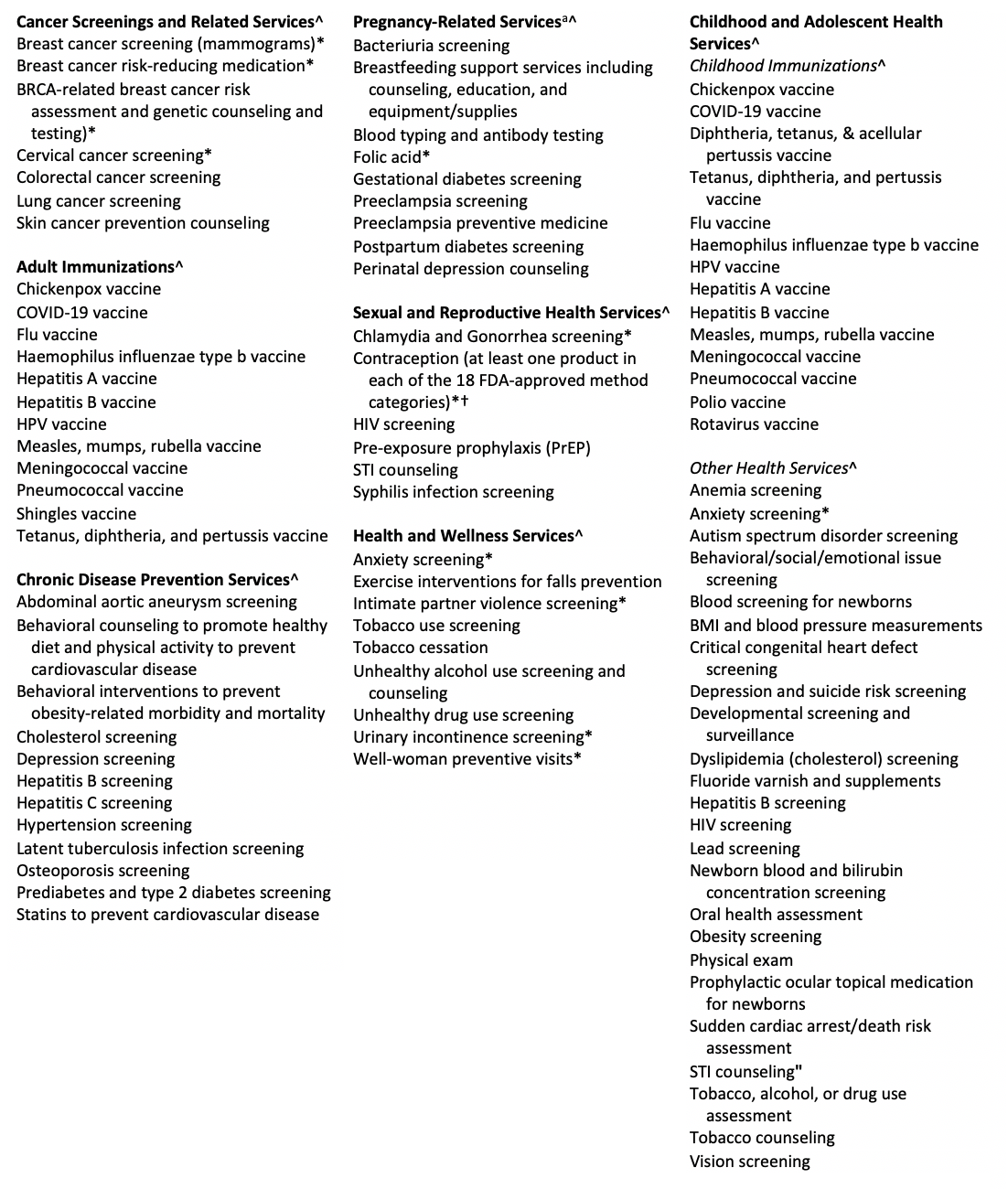From Cancer Screenings to Prenatal Care, the Latest Challenge to the Affordable Care Act Threatens Availability of Free Preventive Services

The Affordable Care Act (ACA) requires most insurers and employers to cover a set of preventive health services at no cost to enrollees. Estimates suggest more than 150 million people benefit from this ACA provision, gaining access to over 100 services such as cancer screenings, contraception, and vaccines without any out-of-pocket costs. A case pending in federal court threatens to cut off consumers’ access by allowing insurers to impose cost-sharing on these services or, in some cases, cease covering them altogether.
The case, Kelley v. Becerra, is before Judge Reed O’Connor, the same judge who previously tried to strike down the entire ACA. We’ve written about Kelley on CHIRblog before; the parties challenging the preventive services mandate primarily argue that the way the ACA defines the list of preventive services that must be covered without cost sharing—incorporating recommendations by the U.S. Preventive Services Task Force (USPSTF) and the Advisory Committee on Immunization Practices (ACIP) as well as guidelines from the Health Resources and Services Administration (HRSA)—is unconstitutional. While some legal experts have pointed out flaws in the plaintiffs’ arguments, others have noted that they may find a warmer reception at the Supreme Court than did previous ACA challenges.
Judge O’Connor held a hearing for Kelley on July 26, and is expected to issue a ruling in the near future. Although a decision to invalidate the preventive services mandate may not take effect immediately, this case jeopardizes consumers’ access to crucial and often life-saving preventive care. As Kelley works its way through the courts, here are some of the currently free services that hang in the balance:

Sources: U.S. Preventive Services Task Force, “A & B Recommendations” (last visited July 22, 2022); Centers for Disease Control and Prevention, Recommended Adult Immunization Schedule for ages 19 years or older (2022); American Academy of Pediatrics, Recommendations for Preventive Pediatric Health Care, Bright Futures (2022); Centers for Disease Control and Prevention, Recommended Child and Adolescent Immunization Schedule for ages 18 years or younger (2022) ; Health Resources & Services Administration, “Women’s Preventive Services Guidelines” (last visited July 22, 2022). Based on recommendations that apply in 2022. Services may be subject to medical management-related coverage limitations. ^Some services apply only to certain age groups and/or those at an increased risk of a disease or infection; *Applies to women (some apply only to women who are planning or capable of pregnancy, or sexually active women; some also apply to pregnant women); ªApplies to pregnant people (some recommendations refer to “pregnant women” while others refer to “pregnant persons”) and/or postpartum people; “Applies to sexually active adolescents; †Subject to religious and moral objections
If the plaintiffs in Kelley are successful, health plans can impose cost sharing on these services, and most employers can decide to drop coverage of preventive care. The Urban Institute recently highlighted evidence of improved health care access following the implementation of the preventive services mandate, including increases in colorectal cancer screenings, blood pressure and cholesterol checks, vaccinations, and use of contraception. Re-introducing cost sharing for these services, which tends to decrease health care utilization, creates a long-term risk of poorer health outcomes among enrollees.
If the district court judge decides to strike the ACA’s preventive services mandate, the decision could either go into effect immediately or be delayed, pending appeal to a higher court. States can take action to protect consumers enrolled in the individual and small group markets, as well as some workers enrolled in state-regulated health plans, by enshrining the requirement to cover these preventive services without cost-sharing into state law. However, a majority of workers with employer-sponsored insurance are covered by plans exempt from most state regulation; consequently, Congress must enact new federal protections to ensure access to these key services.
Takeaway
The preventive services mandate is one of the most popular ACA provisions. Access to preventive services can save lives and improve quality of life. Removing cost barriers to preventive care is associated with better take-up, particularly among financially vulnerable individuals. Kelley poses a significant threat to this progress; allowing health plans to impose cost sharing or drop coverage of this collection of services could significantly reduce access to life-saving care.





